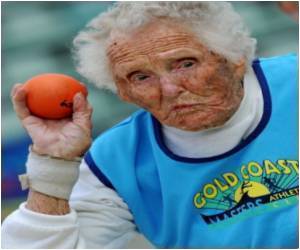Researchers have found that genetic variants play a crucial and complex role in the exceptional longevity in centenarians.

The new study includes additional authors who independently assessed and helped to produce a valid genotype data set, for which the same analysis as in the original paper was performed. It also contains an additional replication data set of subjects with an average age of 107.
Centenarians are a model of healthy aging, as the onset of disability in these individuals is generally delayed until they are well into their mid-90s.
Because exceptional longevity can run strongly in families, and numerous animal studies have suggested a strong genetic influence on life span, the researchers set out to determine which genetic variants play roles in human survival beyond 100 years of age.
They used a well-established Bayesian statistical method for determining which single nucleotide polymorphisms (SNPs, or genetic variants) could, as a group, be used to categorize subjects as centenarians versus controls, based solely upon the genetic information.
The predictive sensitivity of the model they developed, which contains 281 SNPs, increased with the age of the subject, supporting the hypothesis that genes play an increasingly strong role in survival in centenarians.
Advertisement
Many of the 130 known genes associated with the SNPs in the prediction model have been shown by other gerontologists to play roles in age-related diseases and aging, said the study's lead researchers, Paola Sebastiani, PhD, professor of biostatistics at the BU School of Public Health, and Thomas Perls, MD, MPH, associate professor of medicine at the BU School of Medicine.
Advertisement
"When people can do this kind of analysis on whole genome sequences for traits that have important genetic components, the predictive value should be even better," he stated.
The corrected study, as did the original, found that subjects who shared the same profile of variations for genetic markers in the model appeared to share similar levels of risk for various traits or diseases associated with exceptional longevity-most notably, in their ages of survival.
The revised publication appeared in PLoS ONE.
Source-ANI










